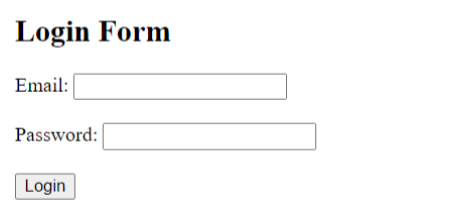Mail id validation along with example
Here's an example of a login form with email validation using JavaScript:
html
<!DOCTYPE html>
<html>
<head>
<title>Login Form</title>
<script>
function validateForm() {
var email = document.forms["loginForm"]["email"].value;
var password = document.forms["loginForm"]["password"].value;
// Email validation using regular expression
var emailRegex = /^[^\s@]+@[^\s@]+\.[^\s@]+$/;
if (!emailRegex.test(email)) {
alert("Please enter a valid email address");
return false;
}
// Perform login logic here
// ...
// Prevent form submission (for demonstration purposes)
return false;
}
</script>
</head>
<body>
<h2>Login Form</h2>
<form name="loginForm" onsubmit="return validateForm()">
<label>Email:</label>
<input type="email" name="email" required><br><br>
<label>Password:</label>
<input type="password" name="password" required><br><br>
<input type="submit" value="Login">
</form>
</body>
</html>In the above example, we have a login form with two fields: email and password. The `validateForm()` function is called when the form is submitted.
Inside the `validateForm()` function, we retrieve the values of the email and password fields using `document.forms["loginForm"]["email"].value` and `document.forms["loginForm"]["password"].value`, respectively.
We then use a regular expression (`emailRegex`) to validate the email format. In this example, we use a simple regular expression that checks if the email has the basic structure of `something@domain.com`. If the email does not match this format, we display an alert message and return `false` to prevent the form from being submitted.
In a real-world scenario, you would perform the actual login logic inside the `validateForm()` function. This might involve making an AJAX request to a server-side script to verify the credentials and handle the authentication process.
Please note that client-side validation is a useful addition for improving the user experience, but it should always be accompanied by server-side validation to ensure security and data integrity.
OUTPUT-

About the Author
Silan Software is one of the India's leading provider of offline & online training for Java, Python, AI (Machine Learning, Deep Learning), Data Science, Software Development & many more emerging Technologies.
We provide Academic Training || Industrial Training || Corporate Training || Internship || Java || Python || AI using Python || Data Science etc


